Between Europe and America
Adelina Marini, June 14, 2010
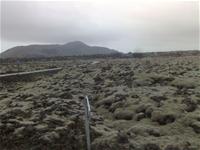 The first feeling after landing in Iceland is of an arrival on the Moon. The international airport in Keflavik is 45 kilometers from the capital Reykjavik, but the road is monotonous. The good highway passes through endless lava fields, covered by grey moss. Nothing more. Lava, moss, cold and grey sea, clouds, here and then a brand new car. As I will understand later however, this is not the only landscape in Iceland and I will also learn that there are reasons for this island (a very little smaller than Bulgaria) to be what it is.
The first feeling after landing in Iceland is of an arrival on the Moon. The international airport in Keflavik is 45 kilometers from the capital Reykjavik, but the road is monotonous. The good highway passes through endless lava fields, covered by grey moss. Nothing more. Lava, moss, cold and grey sea, clouds, here and then a brand new car. As I will understand later however, this is not the only landscape in Iceland and I will also learn that there are reasons for this island (a very little smaller than Bulgaria) to be what it is.
The second impression is that here it was not the people that harnessed nature in an exhausting slavery but quite the opposite. Even the vague attempts of Icelanders to bridle Earth's energy show the respect they have for the planet and its resources.
It is hard for just 4 days one to understand how exactly the Icelanders live, who this year enjoyed not one but two days of summer with temperatures a little over 15 degrees centigrades. They are grateful for every degree over and take out their most summer clothes which we usually take out of the closet with temperatures over 35 degrees. But nonetheless, my agenda there was too good so I've managed to see a lot and different people and get an idea how the vikings' offspring live on this lonely island, stuck between Europe and America. And this is what I intend to tell you in the next articles.
While we were traveling by bus through the lava fields and pastures or by plane 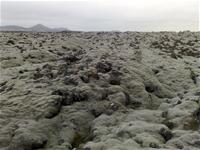 over lonely, sprinkled with snow mountains, I was thinking that I cannot actually look at Iceland in only one way. I had three perspectives formed in my mind.
over lonely, sprinkled with snow mountains, I was thinking that I cannot actually look at Iceland in only one way. I had three perspectives formed in my mind.
A view from Bulgaria
As coming from a country that has turned European Union membership into a national ideology, a strategic goal, a heal-all of its problems, I hoped that I would manage to find a lot of similarities with Iceland. The first thing that popped up in my mind was whether these people would stumble so terribly in chapter number 24 from the accession negotiations when they start - Justice and Home Affairs? The chapter which still is a source of problems for my country and for quite some time for the the EU itself. The paradox is that there are similarities, but the differences seem more.
It is safe saying that in Iceland the level of crime is within the statistical error. Well, some people say that there is a certain increase of crime because of immigrants but they say it in response to my numerous questions, not that it is a problem at all. The similarities, however, are with the high level crime. And especially the one that led Iceland to the edge of bankruptcy two years ago. In fact this is the reason why Iceland, after decades of hesitation, has made up its mind to apply for EU membership on July 17, 2009. A decision that polarised society and is hard to tell whether the island would ever join the Union.
And this is the other paradox - purely technically the country is fully prepared to join as of tomorrow. It would probably take 12 months for all chapters to be went through but just because the process is slow. After all we are talking about a country that is a member of the European Economic Area (EEA), Schengen and a pile of other organisations. Each directive approved in Brussels practically is being introduced in Iceland's legislation. Not only the government but the European institutions agree that there is no problem with accession with this country. It is simply a matter of whether they want to.
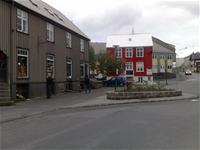 Through my eyes of an exhausted by the 20-year transition Bulgarian, because of the constantly disappearing billions of Bulgarian and European money in the billions of holes in the Bulgarian road grid, the lack of a single entire highway, the constant lamenting of every possible sector of the economy, the neglected homes, the destroyed parks and resorts, the devastated agriculture, Iceland seems to me just another developed EU country. Even with my arrival at the airport in Keflavik I was not required to present any identification. I just went down the plane and entered the country. As anywhere else in the European Union.
Through my eyes of an exhausted by the 20-year transition Bulgarian, because of the constantly disappearing billions of Bulgarian and European money in the billions of holes in the Bulgarian road grid, the lack of a single entire highway, the constant lamenting of every possible sector of the economy, the neglected homes, the destroyed parks and resorts, the devastated agriculture, Iceland seems to me just another developed EU country. Even with my arrival at the airport in Keflavik I was not required to present any identification. I just went down the plane and entered the country. As anywhere else in the European Union.
A country where everything has its own place - the roads are irreproachable. For 30 years the highway that encircles the entire island is finished. The dimension of the country is 103,000 square kilometers (Bulgaria's in comparison is 111,000 sq.km). The length of the highway is around 1,100 km. The asphalt is different - it contains more big stones to enable it to sustain the cold and damp climate. The airport in the second largest city, situated to the north of Iceland - Akureyri, as of last year is with a lengthened runway and now the airport can accept international flights. And there are a lot of such because the city is a tourist centre, a destination for tens of thousands of Germans, Scandinavians and others for a vacation.
Tidy houses, parks, hotels, restaurants - irreproachable, beautiful, neat and clean. 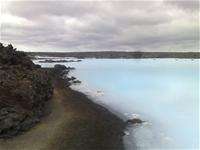 The biggest problem of Icelanders though is the lack of trees. This is why for decades, the areas especially around the towns are being afforested. The process is difficult and painful because the soil is sandy and requires a lot of care to be able to accept the trees. Trees that if not love but at least bare the cold weather.
The biggest problem of Icelanders though is the lack of trees. This is why for decades, the areas especially around the towns are being afforested. The process is difficult and painful because the soil is sandy and requires a lot of care to be able to accept the trees. Trees that if not love but at least bare the cold weather.
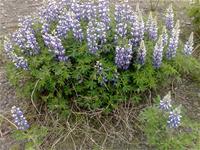 Outside the urban areas the fight with nature to cultivate the fresh lava (only a thousand years old) is being led by .... a flower. A blue flower brought in from Alaska. The only one that can grow at such a northern latitude. But it has not been imported to Iceland because of this but because it cultivates the soil. And this is a scenery that you constantly see - endless lava-fields - fields covered by grey moss and here or there small or big groups of the blue flower.
Outside the urban areas the fight with nature to cultivate the fresh lava (only a thousand years old) is being led by .... a flower. A blue flower brought in from Alaska. The only one that can grow at such a northern latitude. But it has not been imported to Iceland because of this but because it cultivates the soil. And this is a scenery that you constantly see - endless lava-fields - fields covered by grey moss and here or there small or big groups of the blue flower.
All this seems strange to me - how come 300 thousand inhabitants of the island succeeded in achieving all this without being pushed for, without being forced to from outside? My thoughts of course lead me to scientific explanations - people that live far North, where they are forced to survive harsh conditions, are more diligent, more productive because each opportunity could be the last one. We, to the South, where we are literally overwhelmed by natural abundance, light and warmth, regretfully or happily do not bother too much.
Iceland's point of view
No matter the endless day in summer (24 hours of sunshine) and almost the constant night in winter, the Icelanders are smiling, open and unprejudiced. Until the moment you start a conversation about the European Union.
It would be correct to say, however, that the resistance is not in the sense of - no, we do not want to join. The logic is - let us see what we can be offered and then we will decide. And there will be a referendum for sure. Not that it is obligatory under the Constitution but the issue is very serious and divides society so there is no government that could afford taking a decision in the name of 300,000 Icelanders.
Their biggest concern is how the accession negotiations will pass on fisheries. 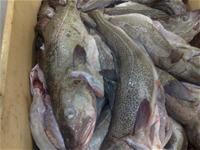 This is the largest industry in Iceland. Fish and fisheries constitute almost half of Iceland's export. The country has 200 miles of fishery zone from the coast. The standards for catch, production and trade are extremely high. The self-confidence not only of the sector but of the Icelanders as well is that this is the business they do best and they do not want anyone to interfere. Every our conversation with whomever in Iceland started and ended with fish.
This is the largest industry in Iceland. Fish and fisheries constitute almost half of Iceland's export. The country has 200 miles of fishery zone from the coast. The standards for catch, production and trade are extremely high. The self-confidence not only of the sector but of the Icelanders as well is that this is the business they do best and they do not want anyone to interfere. Every our conversation with whomever in Iceland started and ended with fish.
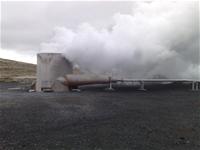 But this is not their only concern. They are also worried for their natural resources. The geological structure of the island, situated over the split of the Eurasian and American tectonic plates, allows Icelanders to obtain over 90% of the energy they need from Earth - geothermal electrical and heat plants, hydro plants. All of them are public property and there are not many arguments in favour of privatisation. The EU membership critics say they are worried that foreign companies will come and start exploiting their resources only for profit.
But this is not their only concern. They are also worried for their natural resources. The geological structure of the island, situated over the split of the Eurasian and American tectonic plates, allows Icelanders to obtain over 90% of the energy they need from Earth - geothermal electrical and heat plants, hydro plants. All of them are public property and there are not many arguments in favour of privatisation. The EU membership critics say they are worried that foreign companies will come and start exploiting their resources only for profit.
And one more very interesting position - Iceland, although it fully realises that it is part of Europe, still cannot define its identity. Its relations with the US are very close and this is evident everywhere - the cars are mainly American, the way they build their houses (although with quite different standards, conformed to the local climate and geological conditions). But in the same time Europe is close to them too. Some people even say that Icelanders are the first Americans because the first Norwegian vikings settled in Iceland in the 9th century. That specific island-style perception of the world can be felt frequently in the country.
The geopolitical position
There is another perspective Iceland could be viewed at. The way we in the 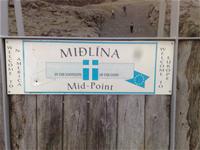 Balkans are firmly convinced in our geostrategic significance, thus the Icelanders do not quite realise how important their geographic situation is. Aside from the fact that the island is almost in the middle between Europe and America, the expectations are in 10 or more years (depending on the melting of the Arctic ice) an Arctic sailing route to open, connecting Asia with the Atlantic ocean - from where the access to Europe and America would be faster and easier.
Balkans are firmly convinced in our geostrategic significance, thus the Icelanders do not quite realise how important their geographic situation is. Aside from the fact that the island is almost in the middle between Europe and America, the expectations are in 10 or more years (depending on the melting of the Arctic ice) an Arctic sailing route to open, connecting Asia with the Atlantic ocean - from where the access to Europe and America would be faster and easier.
Actually, the Chinese presence in Iceland is constantly bringing the attention. The hotels are packed with Chinese and other representatives of Asia. Furthermore, it was just several day ago when Iceland concluded a currency swap agreement with China - goods-exchange cooperation. The more progressive Icelanders, especially those who want their country in the EU often ask their opponents - what kind of independence are you talking about since China is already here? They criticize the short-termness in the mindset of their fellow citizens and especially that of the politicians.
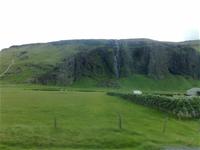 In conclusion to this leading article toward what Iceland actually is, I would say that this country opened my eyes for many things. In the context of the above though - it opened my eyes and made me realise how small the world is. Small to accommodate the variety of geopolitical interests. And in the broader context - at such a place a human realises how insignificant he is, how short its presence on Earth is. Against the background of the "fresh" lava (only a thousand years old) or the monstrous energy of geysers, volcanoes, ice, a human finally realises where he stands in the Universe. Knowledge that can change a lot.
In conclusion to this leading article toward what Iceland actually is, I would say that this country opened my eyes for many things. In the context of the above though - it opened my eyes and made me realise how small the world is. Small to accommodate the variety of geopolitical interests. And in the broader context - at such a place a human realises how insignificant he is, how short its presence on Earth is. Against the background of the "fresh" lava (only a thousand years old) or the monstrous energy of geysers, volcanoes, ice, a human finally realises where he stands in the Universe. Knowledge that can change a lot.